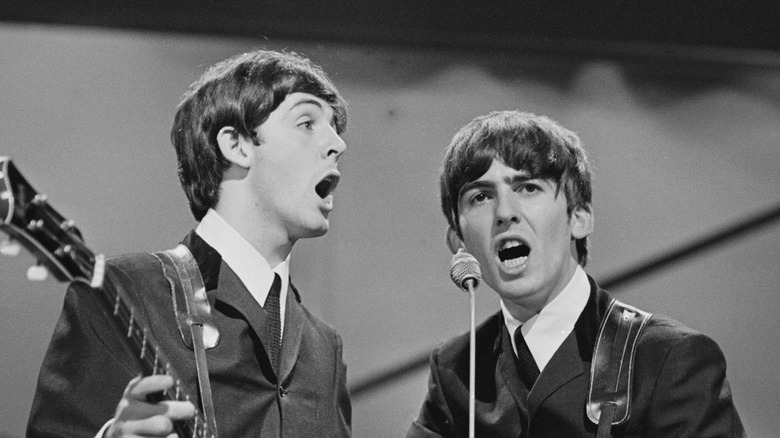George Harrison was often labeled “the quiet Beatle,” but behind that calm, contemplative exterior was a man fighting for his creative voice. As John Lennon and Paul McCartney commanded the spotlight, Harrison’s slow-burning genius simmered in the background — until it finally erupted into one of the most quietly dramatic feuds in rock history.
What unfolded between Harrison and McCartney wasn’t just about egos — it was about respect, recognition, and the pain of being overshadowed in a band that shaped the sound of a generation.
From Bus Rides to Beatles: Brothers in Music
Before the screaming fans and stadium tours, George and Paul were just two schoolboys from Liverpool, bonding on the bus over guitars and Chuck Berry records. Their shared love of music planted the seeds of what would become The Beatles — but even in those early days, their dynamic hinted at what was to come.
As Paul’s star rose, so did his leadership in the band. But George — talented, thoughtful, and increasingly ambitious — began to feel the sting of being sidelined.
A Genius Ignored: Harrison’s Growing Frustration
While Lennon and McCartney dominated the songwriting credits, George was lucky to get one or two songs per album. He had ideas, melodies, lyrics — but few opportunities. His early work was often dismissed or overshadowed. Meanwhile, his own catalog of unreleased gems quietly piled up in the background.
By the late ’60s, Harrison’s talent could no longer be denied. Songs like “Something” and “Here Comes the Sun” weren’t just good — they were masterpieces. Yet even then, he struggled to earn the same respect as his bandmates.

Tension on Tape: The “Let It Be” Meltdown
If there was a breaking point, it happened during the Let It Be sessions — all caught on camera. Paul, ever the studio perfectionist, began nitpicking Harrison’s guitar parts. The moment was famously tense:
“I’ll play whatever you want me to play. Or I won’t play at all if you don’t want me to.” — George Harrison, visibly frustrated.
It was more than a disagreement — it was a creative cry for space in a band where one voice had grown too loud.
Creative Genius Meets Creative Control
Paul’s obsession with detail helped shape the Beatles’ sound, but it often came at a cost. For George, working on songs like “Maxwell’s Silver Hammer” felt draining, even “fruity,” as he later described. He wasn’t just a session guitarist — he was a songwriter bursting with ideas, and he wanted to be heard.
In a rare moment of brutal honesty, George once said:
“I would join a band with John Lennon any day. But I could not join a band with Paul McCartney.”
It wasn’t personal. It was about creative chemistry — and the lack of it.
The Feud Beneath the Surface
Unlike the explosive fights between Lennon and McCartney, the Harrison-Paul tension was quieter — but just as real. Paul himself later admitted that he and John had underestimated George.
“He was a late bloomer,” Paul said. “And we didn’t give him enough credit.”
By the time Abbey Road was released, Harrison’s songs were standing toe-to-toe with Lennon-McCartney classics. And even Paul had to admit:
“George wrote some of the greatest songs ever.”
https://youtu.be/8c0RYMpSEQE
A Final Reunion and a Silent Goodbye
Despite the decades of tension, there was still love. In George’s final days, Paul visited him in a New York hospital.
“We held hands,” Paul recalled. “He was my baby brother.”
It was a moment of quiet reconciliation — two men who had shared a wild, beautiful, and often painful ride finally finding peace.
🎧 Why This Story Still Matters
The story of George Harrison and Paul McCartney isn’t just Beatles lore — it’s a powerful reminder of how even the most legendary partnerships are shaped by struggle. It’s about finding your voice when others talk over you. About standing your ground when you’re constantly underestimated. About respect earned the hard way.
So next time you listen to “Something” or “Let It Be,” listen closer. Behind the harmonies, you’ll hear the echoes of a deeper story — one of friendship, friction, and the fight to be heard.






